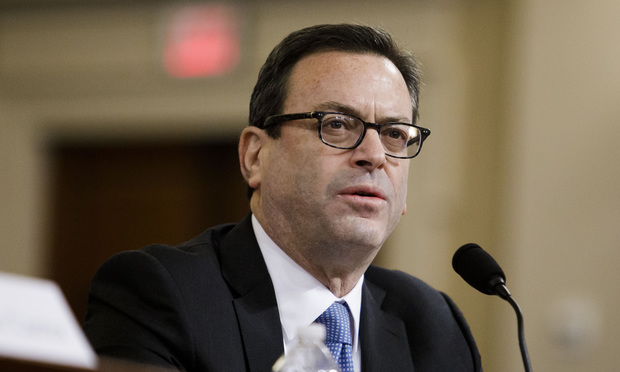Kramer Levin's Barry Berke Is Ready to Talk
"There was a trifecta of Constitutional wrongdoing: abuse of power, betrayal of national security and corruption of our election," Berke says.
February 20, 2020 at 12:56 PM
7 minute read
 Barry Berke. Photo: Diego Radzinschi/ALM
Barry Berke. Photo: Diego Radzinschi/ALM
Last fall, when Barry Berke suddenly catapulted to fame as the lawyer who nailed former Trump campaign manager Corey Lewandowski during his testimony before the House Judiciary Committee, I chased him down.
 I wanted to get the inside scoop about his role as the House Judiciary special oversight counsel—the committee handling the presidential impeachment inquiry. Like any sensible lawyer in that position, Berke politely declined my invitation. But he did assure me that he would happily answer all my questions once his job was concluded.
I wanted to get the inside scoop about his role as the House Judiciary special oversight counsel—the committee handling the presidential impeachment inquiry. Like any sensible lawyer in that position, Berke politely declined my invitation. But he did assure me that he would happily answer all my questions once his job was concluded.
Berke kept his word. On his first day back at Kramer Levin Naftalis & Frankel, where he's co-chair of the litigation department, we sat down in his light-filled office in midtown Manhattan to talk about what he saw and did during his (and the nation's) tumultuous year that culminated in Trump's impeachment trial.
Below is an edited version of our conversation.
You were the breakout star—practically the Brad Pitt of the impeachment proceedings. All those glowing reviews about how you saved the day by getting Corey Lewandowski to admit that he lied about his role in the Mueller investigation. Did you expect to be treated like a hero? I was very surprised because cross-examination is what I do. It was only 30 minutes. I was only focused on the task at hand.
You made lawyers look good—for a change. People remarked that it takes a real lawyer to handle a slippery witness and that the politicos were inept. Did you think they did a bad job? Not at all. They were confronted with a witness who didn't cooperate, who took advantage of the system in which members had only five minutes to ask questions. Since I had 30 minutes, I wanted to make sure the facts came out—that Lewandowski was asked to do something improper [by Trump] and that he was conscious about his own criminal exposure.
That was a high point for you, along with your opening statement at the hearing in which you outlined the Constitutional arguments for impeachment. So what are the low points? The frustration of confronting the president's and the administration's efforts to block our investigation. We thought the evidence should be presented to the American people. The effort was unprecedented, antithetical to the Constitution and the relations between the branches.
There's some criticism that the Democrats didn't push hard enough, like bringing legal action to compel compliance with subpoenas. There's a long list of key witnesses that the committee didn't force to testify, including Rudy Giuliani, Mick Mulvaney, Mike Pompeo and Rick Perry. We won our court cases and got favorable rulings about Don McGahn and the grand jury documents related to the Mueller investigation. But the problem is that the process took too long. In the McGahn matter, it took six months to get the ruling, and there's no end in sight. The amount of time it would take to resolve issues didn't allow us to do the investigation in a timely way.
Were there disagreements and tensions between the lawyers and the politicians about strategy? It was a collaborative process. Views were discussed, and all the various committees came together. I'd compare it to a trial: When you are in the trenches and there's a common enemy, you work together to figure out how to overcome the resistance.
I found it a bit heartbreaking to watch the impeachment trial because we all knew how it was going to end, and it didn't matter what the facts were or how skillfully you presented the case. How did you all power through that knowing that it was an exercise in futility? While there's a substantial part of the country that knew the facts, there was also a substantial part that didn't. Not all the Republican senators watched the proceedings, so we felt an obligation to educate people about why the witnesses were important, why the conduct was wrong. There was a trifecta of Constitutional wrongdoing: abuse of power, betrayal of national security and corruption of our election. We had an administration that argued that if you want witnesses, you have to go to court; while at the same time, they were also arguing that presidential and congressional disputes can't be resolved by the court. We felt it was important to lay it out and show that this challenge to our democratic system would be the founders' worst nightmare.
For all the hard work, Trump was exonerated, and now he's gloating. He's also on a revenge rampage and will likely pardon those who've been convicted of wrongdoing in this matter. How does that make you feel? The question is how to define "winning." In my mind, the goal was to bring to light the president's conduct to the American people and how it fits into our Constitutional framework. We thought the facts were indisputable. Trump lied about the Mueller investigation, and that evidence became more meaningful when he did it again concerning Ukraine. It shows a pattern. Each of those steps takes us further down the runway, and his supporters are running out of runway. They will have a harder and harder time defending his conduct. So even if we didn't achieve our goal at this trial, it gives shape to his conduct. The last chapter before the next election has not yet been written.
So you're still optimistic. I believe truth matters and that facts rise to the surface. I left Washington very impressed by members of the Congress that I worked with and how they work every day to hold the president accountable. This will require new tools of oversight of presidential conduct. The ultimate jury will be the people who get to vote in November, and I believe the facts of what the president did—the subject of our proceedings—will be front and center.
But what if Americans don't care and Trump wins? I feel my role was to help the House managers and bring the president's conduct to light, and I feel we've accomplished that. Think about where we started. Before we had hearings, the president's supporters said none of it happened. After the hearings, no one was denying it happened; his supporters then said the conduct didn't rise to an impeachable offense.
Many people I know feel totally exhausted by the whole process—and we were just observers who had the option of tuning out. But you must be beyond exhausted. Are you sad? I have two minds—great pride about working with the extraordinary committee, House managers and staff and what we've accomplished; but I'm also disappointed that the overlay of politics was so significant that it caused the supporters of the president to turn a blind eye to very serious Constitutional wrongdoing that jeopardized national security and the rule of law.
Did you have private chats with Republicans? Was there a moment where you felt a connection with the other side? I spent time talking to some of the Republicans, but for many, the divide was so great and the support for the president so absolute that it was hard to get past that. I will say, though, that during the Senate trial there were moments when the evidence of wrongdoing felt impactful for everyone in the room.
What about your future? You've garnered so much positive press. Have you thought of running for political office? No. To go back where I began. I love what I do here. What brought me to Washington was a call to service. It was a unique time in history. I'm thrilled to be back at Kramer and my clients in the greatest city in the world.
Contact Vivia Chen at [email protected]. On Twitter: @lawcareerist.
This content has been archived. It is available through our partners, LexisNexis® and Bloomberg Law.
To view this content, please continue to their sites.
Not a Lexis Subscriber?
Subscribe Now
Not a Bloomberg Law Subscriber?
Subscribe Now
NOT FOR REPRINT
© 2025 ALM Global, LLC, All Rights Reserved. Request academic re-use from www.copyright.com. All other uses, submit a request to [email protected]. For more information visit Asset & Logo Licensing.
You Might Like
View All
Change Is Coming With the New Trump Era. For Big Law, Change Is Already Here
6 minute read


Letter From London: 5 Predictions for Big Law in 2025, Plus 5 More Risky Ones
6 minute readLaw Firms Mentioned
Trending Stories
Who Got The Work
J. Brugh Lower of Gibbons has entered an appearance for industrial equipment supplier Devco Corporation in a pending trademark infringement lawsuit. The suit, accusing the defendant of selling knock-off Graco products, was filed Dec. 18 in New Jersey District Court by Rivkin Radler on behalf of Graco Inc. and Graco Minnesota. The case, assigned to U.S. District Judge Zahid N. Quraishi, is 3:24-cv-11294, Graco Inc. et al v. Devco Corporation.
Who Got The Work
Rebecca Maller-Stein and Kent A. Yalowitz of Arnold & Porter Kaye Scholer have entered their appearances for Hanaco Venture Capital and its executives, Lior Prosor and David Frankel, in a pending securities lawsuit. The action, filed on Dec. 24 in New York Southern District Court by Zell, Aron & Co. on behalf of Goldeneye Advisors, accuses the defendants of negligently and fraudulently managing the plaintiff's $1 million investment. The case, assigned to U.S. District Judge Vernon S. Broderick, is 1:24-cv-09918, Goldeneye Advisors, LLC v. Hanaco Venture Capital, Ltd. et al.
Who Got The Work
Attorneys from A&O Shearman has stepped in as defense counsel for Toronto-Dominion Bank and other defendants in a pending securities class action. The suit, filed Dec. 11 in New York Southern District Court by Bleichmar Fonti & Auld, accuses the defendants of concealing the bank's 'pervasive' deficiencies in regards to its compliance with the Bank Secrecy Act and the quality of its anti-money laundering controls. The case, assigned to U.S. District Judge Arun Subramanian, is 1:24-cv-09445, Gonzalez v. The Toronto-Dominion Bank et al.
Who Got The Work
Crown Castle International, a Pennsylvania company providing shared communications infrastructure, has turned to Luke D. Wolf of Gordon Rees Scully Mansukhani to fend off a pending breach-of-contract lawsuit. The court action, filed Nov. 25 in Michigan Eastern District Court by Hooper Hathaway PC on behalf of The Town Residences LLC, accuses Crown Castle of failing to transfer approximately $30,000 in utility payments from T-Mobile in breach of a roof-top lease and assignment agreement. The case, assigned to U.S. District Judge Susan K. Declercq, is 2:24-cv-13131, The Town Residences LLC v. T-Mobile US, Inc. et al.
Who Got The Work
Wilfred P. Coronato and Daniel M. Schwartz of McCarter & English have stepped in as defense counsel to Electrolux Home Products Inc. in a pending product liability lawsuit. The court action, filed Nov. 26 in New York Eastern District Court by Poulos Lopiccolo PC and Nagel Rice LLP on behalf of David Stern, alleges that the defendant's refrigerators’ drawers and shelving repeatedly break and fall apart within months after purchase. The case, assigned to U.S. District Judge Joan M. Azrack, is 2:24-cv-08204, Stern v. Electrolux Home Products, Inc.
Featured Firms
Law Offices of Gary Martin Hays & Associates, P.C.
(470) 294-1674
Law Offices of Mark E. Salomone
(857) 444-6468
Smith & Hassler
(713) 739-1250










